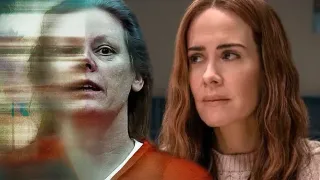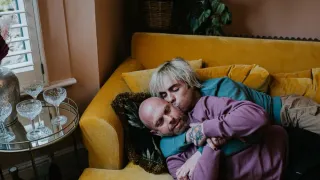
4 hours ago
Kieron Moore Shines in Elliot Tuttle’s Bold Queer Drama “Blue Film”
READ TIME: 2 MIN.
Elliot Tuttle’s “Blue Film” has emerged as one of the most talked-about queer films of the year, premiering at the Edinburgh International Film Festival after facing rejection from several major LGBTQ+ festivals due to its challenging subject matter . The film centers on Aaron Eagle, a jaded fetish camboy played by British rising star Kieron Moore, who agrees to spend a night with an anonymous client, only to discover a deeply fraught connection from their shared past . Reed Birney co-stars as Grant, a former teacher whose encounter with Aaron forces both men to confront uncomfortable truths about desire, regret, and survival .
Set almost entirely over the course of a single night, “Blue Film” unfolds as a tense chamber drama that strips away the defenses of its two protagonists. The film’s narrative is anchored by Moore’s magnetic performance, as his character transitions from cocky bravado to raw vulnerability, and Birney’s nuanced portrayal of a man wrestling with shame and longing . Critics have praised the film for its fearless depiction of desire and trauma, as well as its refusal to offer simple moral judgments or easy resolutions .
Director Elliot Tuttle, drawing on personal reflections of sexual awakening, crafts a narrative that is both provocative and deeply human . The film’s dialogue, at times philosophical and self-reflexive, invites viewers to question the boundaries of empathy and the complexities of queer desire.
“Blue Film” made its world premiere at the Edinburgh International Film Festival, earning recognition for its boldness and artistry even as its subject matter proved divisive . The film’s selection by EIFF, after being declined by other prominent queer festivals, has sparked renewed debate within the industry about censorship, the depiction of taboo topics, and the role of queer festivals in fostering open dialogue .
Festival organizers and commentators have commended “Blue Film” for its willingness to address the “thorny edges of desire” and provoke meaningful conversation about trauma, consent, and the ways in which LGBTQ+ individuals navigate complex relationships with their pasts . The film’s challenging themes have led to post-screening discussions and Q&A sessions, providing audiences with a forum for nuanced engagement beyond the screen .
At the heart of “Blue Film” is a fearless commitment to portraying LGBTQ+ characters with honesty and complexity, resisting reductive or sensationalized narratives. By focusing on the interpersonal dynamics between two flawed individuals, the film encourages viewers to grapple with uncomfortable truths about power, memory, and the impact of societal taboos on queer lives .
The film’s reception has highlighted ongoing tensions within the LGBTQ+ community about representation, with some applauding its bravery and others expressing concern about the potential for harm or misunderstanding. Festival director David Hatkoff described the work as “at once erotic and deeply unsettling,” underscoring its capacity to both challenge and move audiences .
As “Blue Film” continues its festival run and seeks wider distribution, it stands as a testament to the evolving landscape of queer cinema—one that embraces complexity, fosters dialogue, and refuses to shy away from the most difficult questions facing LGBTQ+ people today .






